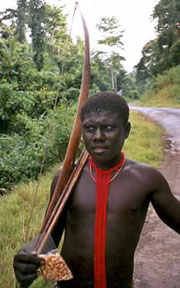 |
|
Hunter-gatherers face
extinction on India island
| |
"Jarawa turn hostile" screamed the headline from
the local paper.
Indignantly, it reported how primitive tribesmen came out of the jungle
armed with bows, arrows and spears,
raided a village in India's Middle Andaman island and
looted tools, food, clothes,
cash and jewelry. It was the first such attack in seven years.
An indication that the Jarawa hunter-gatherers remain untamed
primitives -- or a cry for help from man's earliest ancestors, their
forests and their lifestyle, their existence under threat as never before?
"It is usual that poachers enter into Jarawa reserve areas to hunt wild
animals," a tribal welfare officer blithely notes in an internal report on
April's attack, obtained by Reuters.
Some of the poachers, he said, had stolen honey buried by the Jarawa
and destroyed the carved containers used to store it.
Honey is the only food the Jarawa store, one of the most precious
things they have. Enraged, they had
retaliated.
"It is really frightening," said author and activist Madhusree
Mukherjee. "The surest way to kill hunter-gatherers is to take away their
territory."
The Jarawa are one of four ancient Negroid tribes barely surviving on
the Andamans. Last month, Indian scientists said DNA evidence suggested
they were direct descendents of man's earliest ancestors, who migrated
from Africa 65,000 to 70,000 years ago, only to be stranded on the islands
by rising seawater.
Until just a few years ago, the Jarawa lived in isolation, preserving a
simple lifestyle in their own Garden of Eden. Then the government built a
road through their forest.
The 343-km (213-mile) Andaman Trunk Road (ATR), completed in 1989, was
designed as an economic lifeline to link the island chain. Anthropologists
say it has had a more sinister
impact.
"The road may look like a little strip of land cutting through the
forest, but it is a conduit opening the Jarawa up not just to germs but to
all kinds of outside influence," said Mukherjee. "Outsiders induce
addictions. They supply them with tobacco or alcohol, so the Jarawa keep
coming back, and have to bring their forest resources out to feed their
addictions."
In 2002 the Supreme Court ordered the Andaman and Nicobar government to
close the 129-km (80-mile) stretch of the ATR passing through the Jarawa
reserve. But the road remains open.
Reuters took the road to the edge of the Jarawa reserve last month. As
we waited, a truck came out of the reserve piled high with bamboo, in
contravention of a court ban on logging.
In the old days, the Jarawa used to chase outsiders away with their
bows and arrows. In just a few years since the road was opened, many have
learned basic Hindi, as well as modern vices.
"They used to come for food, coconuts and bananas," said M. Rajendran,
who runs a roadside tea shop on the edge of the reserve. "Now, they
come for tobacco and paan (an addictive mixture of betel
leaves and areca nut)."
(Agencies) |
印度报纸头条惊呼:加洛瓦人充满敌意。
印度当地报纸愤愤不平地报道:一伙原始部落的人冲出丛林,手持弓箭和长矛,袭击了位于印度中安达曼岛上的一个村庄,将工具、食物、衣服、现金和珠宝首饰洗劫一空之后扬长而去。这是七年来在当地首次发生这样的袭击事件。
这是加洛瓦狩猎采集者们仍生活在未开化的原始状态的一个迹象?还是来自人类远祖的呼救声,因为他们赖以生存的森林、他们的生活方式甚至生存状态目前都面临着前所未有的威胁?
“偷猎者经常会为猎取野生动物闯进加洛瓦保护区。”在路透社得到的一份关于四月份袭击事件的内部调查报告中,一位部落福利官员坦率地指出。
他透露,一些偷猎者盗取了加洛瓦人储藏起来的蜂蜜,并捣毁了储存蜂蜜用的雕刻容器。
蜂蜜是加洛瓦人所储存的唯一食物,也是他们所拥有的最珍贵的物品之一。显然蜂蜜被盗激怒了他们,于是他们就展开了报复行动。
“这可真让人不寒而栗,”作家、行动主义者麦德胡斯利·姆科赫尔基说,“灭绝这些狩猎采集者们最稳妥的办法就是夺取他们的领地。”
加洛瓦人是至今依然勉强生存在安达曼群岛上的四个古老黑人部落中的一个。上个月,印度科学家们声称,DNA证据显示加洛瓦人是人类远祖的直系后裔,在大约65,000至70,000年前从非洲迁移至此地,后因海水上涨而被困在这些岛屿上.
而仅仅在几年之前, 加洛瓦人还生活在与世隔绝的状态,在他们的伊甸园里保持着简朴的生活方式。后来,政府修建了一条公路,正好穿过他们所居住的森林。
长约343公里(213英里)的安达曼干道于1989年竣工。它被设计成连接安达曼列岛的经济交通线。然而,人类学家们认为这条公路已经带来了相当恶劣的影响。
“这条公路就像是从森林中分割出来的一小片地带,但是这条通道不仅使加洛瓦人受到各种细菌的威胁,也把他们置于外界影响之下,”姆科赫尔基说,“外面的人带来了许多容易让人上瘾的东西。他们供给加洛瓦人香烟和酒类,这样加洛瓦人就不停地回来,把他们的森林资源拿出去卖,以满足他们的烟瘾或酒瘾。”
早在2002年,印度最高法院就命令安达曼和尼克巴地方政府关闭安达曼干道中穿过加洛瓦保护区的一段长129公里(约80英里)的公路。但目前这条路仍处于开放状态。
上个月,路透社记者曾沿路来到加洛瓦保护区的边缘地带。等待时,一辆满载竹子的大货车驶出了保护区,而当地法院早就禁止在保护区内砍伐树木。
过去,加洛瓦人手持弓箭将外来人驱逐出保护区。但是,自这条公路开通以来的几年时间里,他们中的不少人不但学会了基本的印地语,而且也沾染上了当代社会的恶习。
“他们以前来这里是为了获取食物、椰子和香蕉,但是现在他们的目标变成了香烟和哌安(一种由萎叶和槟榔果制成的混合物,食用容易使人上瘾)。”姆·拉金德兰说。他在保护区的边上经营着一家路边茶馆。
(中国日报网站译) |
